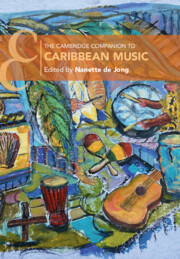Book contents
- The Cambridge Companion to Caribbean Music
- Cambridge Companions to Music
- The Cambridge Companion to Caribbean Music
- Copyright page
- Dedication
- Contents
- Figures
- Contributors
- Foreword
- Acknowledgements
- 1 Introduction to the Caribbean and Its History
- 2 Race and Transculturation
- 3 Salsa Soundings
- 4 Blackness and Identity
- 5 From the Island to Global Stages
- 6 Investigating the Caribbean’s African Past
- 7 Reframing Diasporic Belonging
- 8 Competition, Conflict, and Cooperation
- 9 Uncovering Hidden Histories of Meaning
- 10 The Foundations of Rap Music and Post-colonial Emancipation
- 11 Konpa, Zouk, and the Politics of World Music
- 12 Globalisation in the Reggae and Dub Diaspora
- 13 Musical Orality and Literacy in the Transmission of Knowledge and Praxis
- 14 Narratives of Return
- 15 Decolonising Caribbean Imaginaries
- Index
- References
15 - Decolonising Caribbean Imaginaries
Conclusion
Published online by Cambridge University Press: 17 September 2022
- The Cambridge Companion to Caribbean Music
- Cambridge Companions to Music
- The Cambridge Companion to Caribbean Music
- Copyright page
- Dedication
- Contents
- Figures
- Contributors
- Foreword
- Acknowledgements
- 1 Introduction to the Caribbean and Its History
- 2 Race and Transculturation
- 3 Salsa Soundings
- 4 Blackness and Identity
- 5 From the Island to Global Stages
- 6 Investigating the Caribbean’s African Past
- 7 Reframing Diasporic Belonging
- 8 Competition, Conflict, and Cooperation
- 9 Uncovering Hidden Histories of Meaning
- 10 The Foundations of Rap Music and Post-colonial Emancipation
- 11 Konpa, Zouk, and the Politics of World Music
- 12 Globalisation in the Reggae and Dub Diaspora
- 13 Musical Orality and Literacy in the Transmission of Knowledge and Praxis
- 14 Narratives of Return
- 15 Decolonising Caribbean Imaginaries
- Index
- References
Summary
This chapter demonstrates how decolonisation serves as a crucial point of reference in this book. Each chapter has unpacked ‘the colonial encounter’ – that sustained collision of ‘new’ and ‘old’ worlds, from the mass movements of people (many taken into the Caribbean against their will) to imperialism’s continued economic, political and social conquests – through music analysis, thereby addressing the visibility of issues confronting the colonising methods and scope of music scholarship of previous scholarship on the Caribbean and Caribbean music.
- Type
- Chapter
- Information
- The Cambridge Companion to Caribbean Music , pp. 227 - 239Publisher: Cambridge University PressPrint publication year: 2022



